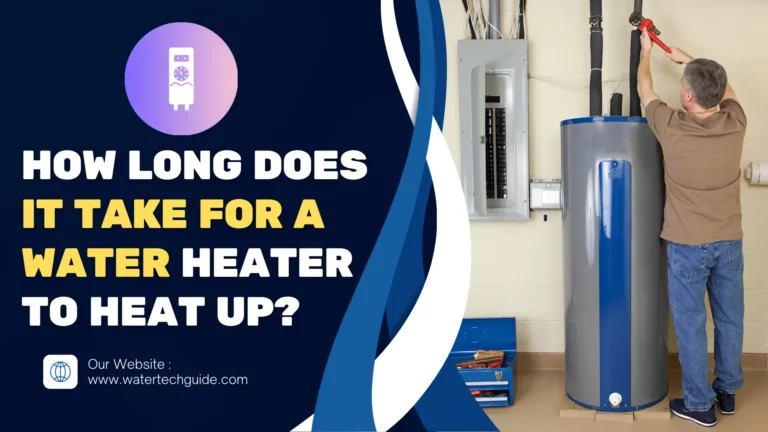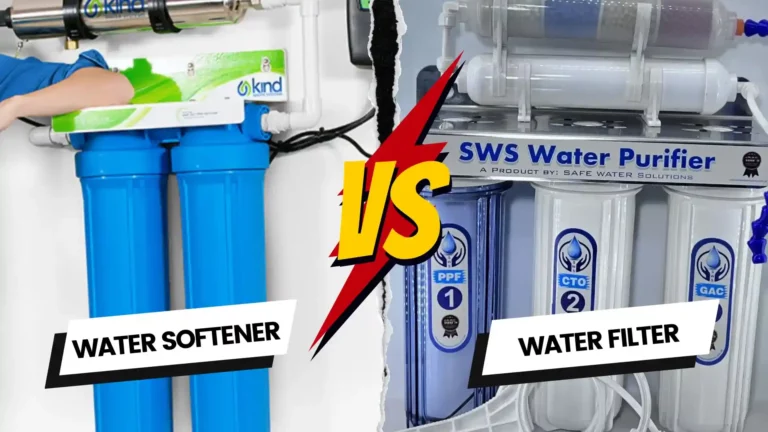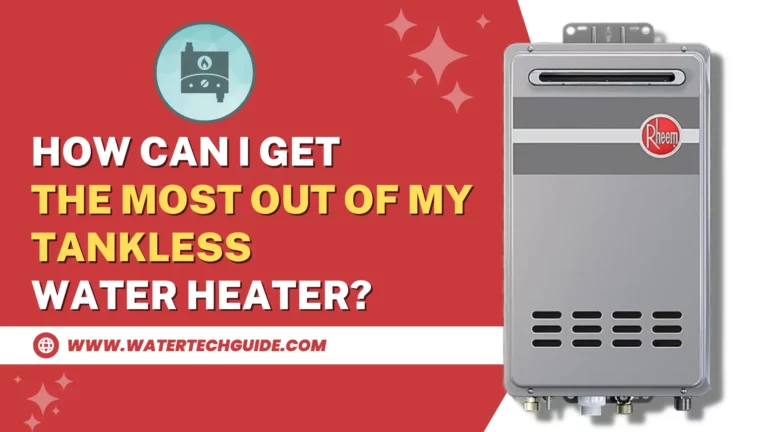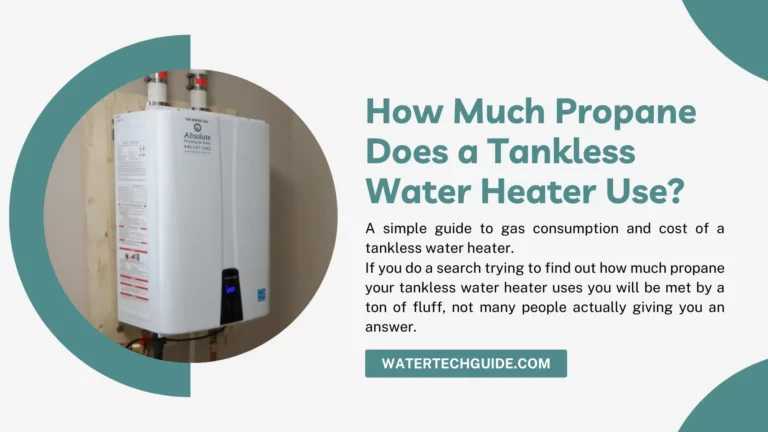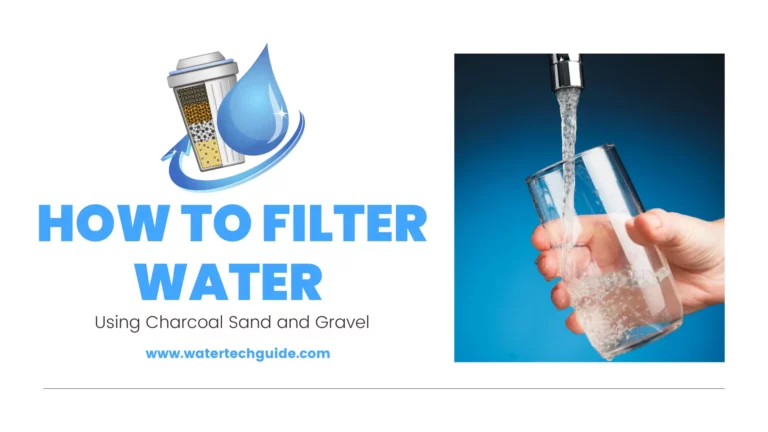How Does a Tankless Water Heater Works?
The functions of a tankless water heater stand in different directions with a water-based heater. Here we discuss “how does a tankless water heater works” Simply put; the previous heats are waterproof while the last one is in charge of the water flow inside. Similarly, if you have a stabilizer or a washing machine then easily use the hot water. The heat generated in the tank during these idle times is known as the heat loss of the pile.
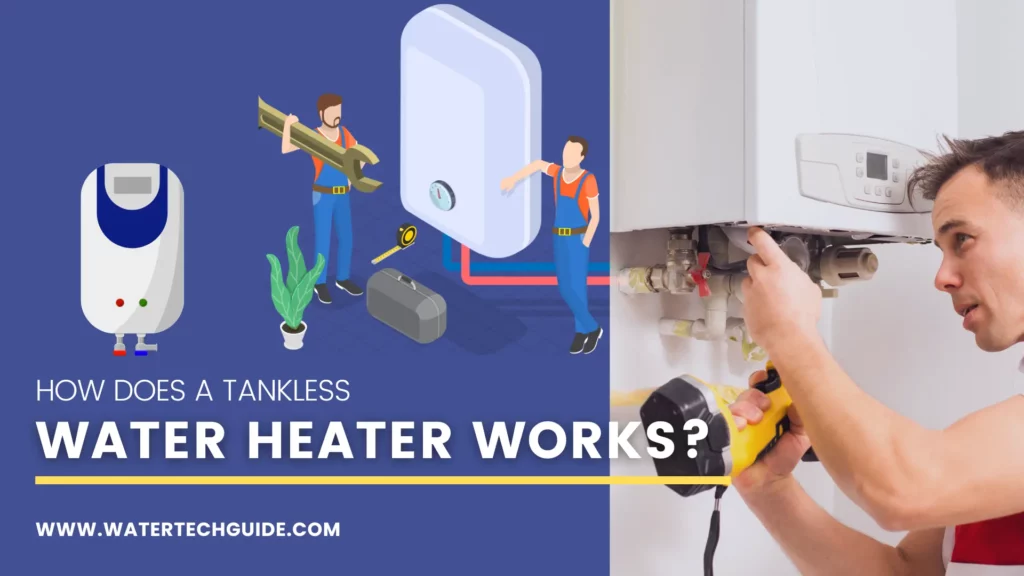
Losing Heat
In a tankless system, there is no such thing as losing heat set aside. Because the water evaporates only when you wrap a cellulite or washing machine. Similarly, set it to run at warm or warm temperatures. The lack of thermal loss in wireless water heaters is the quality that makes the units. Whether, antagonistic or electric and more efficient than tank-based water heaters.
Included things
Depending on the type of tankless system used, the heat exchanger includes electric coils. Also, include a hot gas generator that stores water when it passes through. In a tankless water heating system, the heat exchanger functions work as follows:
- Activation of the heat extinguisher works when you turn your soup to a warm or hot place. When you do a hot washing cycle on your washing machine or washing machine.
- The activated heating system heats the excess water at any temperature you choose.
Heating Process With How Does a Tankless Water Heater Works?
The heating process is as simple as that. When the heater starts working in the passing water, all you need to do is sweat. Whether you wash your hands, wash or bathe, or wash the dishes by hand.
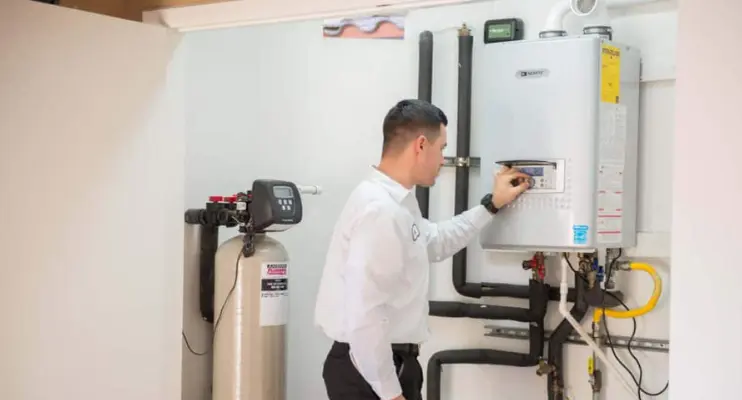
One waterless heater is enough for your whole house – or one or two exits. It all depends on the size of your house and the type of system you choose. There are two types of tankless heating systems:
- The use of a heater is small program that manage two shops, such as kitchen sinks and dishwashers. Most of the heat it uses are electric types.
- Burners of the whole house. All programs manage the entire water supply area of the house. Also, in the kitchen, the bathroom (the room), and the laundry.
1. How Does a Tankless Water Heater Work in the Whole House?
Although it may look like a whole-house heater may be the obvious choice for a large house. Many homeowners prefer to have a local heater that works somewhere. This is due to the compactness of the heater-point-of-use, which enables us to place them in smaller spaces.
Everything You Need to Know About Tankless Water Heaters
Warm running water is one of the most important services for all households. Whether you need to wash your hands, bathe, use the dishwasher or throw in the laundry, you need to always get warm and hot water.
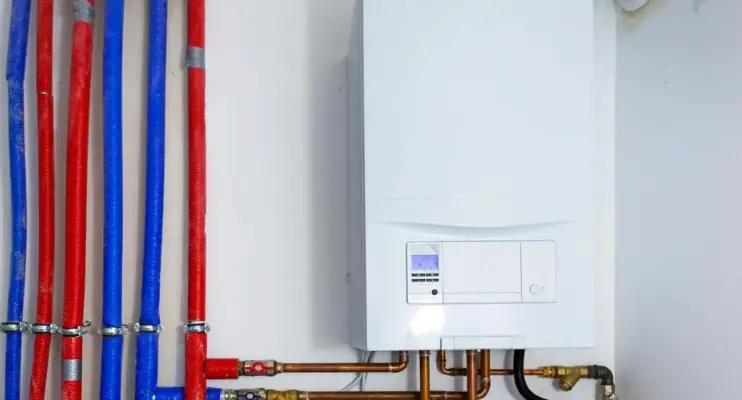
The problem is many homes throughout America have a warm and well-watered well. This problem is especially prevalent in big cities, where family members often meet when changing and separating luggage from overnight.
Limitations for Families
Granted, some families can handle this kind of discipline – but the limitations are severe in many cases, especially when one of the following occurs:
- Shower lineups. If everyone needs a shower, however, the tank runs out of warm water after 10 minutes, this can set the river on everyone’s day – especially when everyone has to get to work or school or do something important.
- Clean the piles. If the current food bowl cycle is too full, all the dishes brought to the sink and countertops. But there is only hot water for one cycle every few hours. The wait of time between bath cycles can be quite distracting. Especially for you with friends or family coming to visit.
If problems like this often occur in your house, it’s time to look for changes in your water heating system. Come out with an old water heater and a new water heater!
What Is a Tankless Water Heater?
The idea behind a tankless water heater is to heat the water when it worked, by you, to do so. You turn on the heating process when you turn your boat into a warm or hot place.
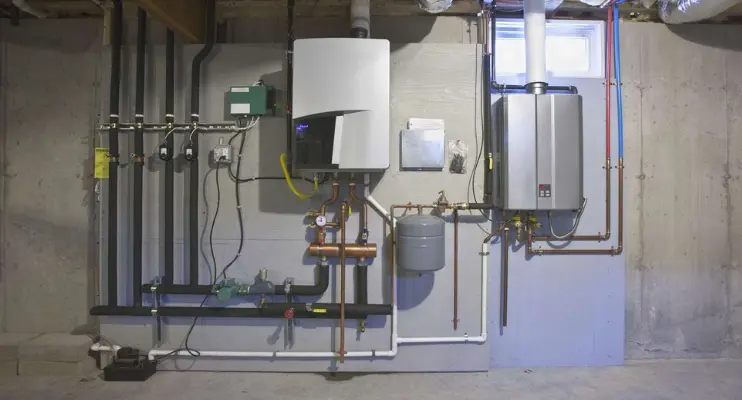
In general, this is a more efficient option than a conventional tank. Based heater, where water is heated regularly regardless of whether you are sleeping in or out of your house that day.
In the United States, the popularity of low maintenance tankless water heaters in domestic applications has been a recent phenomenon. Traditionally, heat-based water heating has become a common practice among the average American householders. However, the growing environmental conscience of U.S. Consumers has LEDs to demand alternative methods of heating in water heaters.
2. How Does a Tankless Water Heater Work in the U.S.?
In response to this new need, manufacturers and retailers operating in the U.S. have looked to solutions used in other parts of the world. The answer to this desire for a greener water solution has resulted in the introduction of a sterile water heater, which has been stationed in Japan and Europe throughout the period.
Renewable Energy Option
There are many things that can make you a top moderator for renewable energy options, such as:
- A heater that soothes the sick. If your existing tank heater is on then its last working legs might be time to make the switch to a tankless heater.
- High electricity and water bills. If your current electricity and water bills are too wet, then a waterproof heater can help you cut both costs.
- Carbon foot drawings. If you are tired of the greenhouse gas emissions from your gas-fired heater then an energy-efficient alternative can help you a lot in problems.
- Space problems. If your current tank-based heater has taken up too much space in your basement or garage – or if you just wish to shorten the distance between the heat source and the water outlet – a small system with no engine would be the perfect answer.
More Expensive
Truth be told, wireless water heaters are usually more expensive than their tank-built counterparts. But the money you can reap from water use and electricity consumption can bring back additional costs in a timely manner. So, when you decide to install a waterproof heater in your home, the result is often a win-win situation where you have to save and be easy.
Pros and Cons of How Does a Tankless Water Heater Works
There are many benefits that come with electric water heaters, which are durable, efficient, and easy to maintain. In many different dwellings, how does a tankless water heater works? Admittedly, tank heaters also have some drawbacks, but capacity is usually conditional and depends on whether you go for propane or an electric unit.
1. How Does a Tankless Waters Heater Work (Pros)?
- Tax deduction. Most waterproof heaters come with a tax rebate of $ 300. As it turns out, there is a financial incentive to choose a wireless water heater than standard options.
- Unlimited hot water. An electric water heater will not leave you without hot water. If you live in a large house, there is no need to wait between the showers in the shower because the water supply is not hot.
- Long life. Wireless water heaters last longer than heater models in the tank. On average, a waterproof heater or waterproof propane lasts anywhere from five to ten years than a tank water heater.
- Great performance. Because tankless water heaters do not heat water continuously when the water is not working, you can achieve energy efficiency with a waterproof heater, which can generate heat only when you need warm or hot water.
- Computer size. Wireless water heaters usually take up less space than conventional water-based heaters. The compact size can make things, especially convenient if you choose to get a separate wireless heater for each burner, showers, and washers.
2. How Does a Tankless Water Heater Work in an Environment
- Hungry anywhere. Tank water heaters are usually placed on the floor, a tankless water heater can be placed anywhere near the house. Because tank water heaters are available in large sizes and tankless are in small sizes. You can put one under your kitchen sink, one in your bathroom, and one in your laundry room.
- Low heat costs. A tankless water heater consumes a low level of gas or electricity but a tank water heater consumes more level of gas or electricity. You easily save a lot on your monthly bills of gas or electricity by using a tankless water heater.
- The environment is friendly. An electric water heater will not produce greenhouse gases. As such, wireless water heaters are more environmentally friendly than all the other options – even more so than tank-based water heaters.
- Remote Operation Most wireless water liters operate remotely, making it easy to charge.
- It’s safe. A tankless water tank cannot cause any kind of flooding in your area. In contrast, a water heater based on a tank can flood your basement or floor if the form explodes in the body of the tank or pipe connected.
You can see the top tankless heaters brands here.
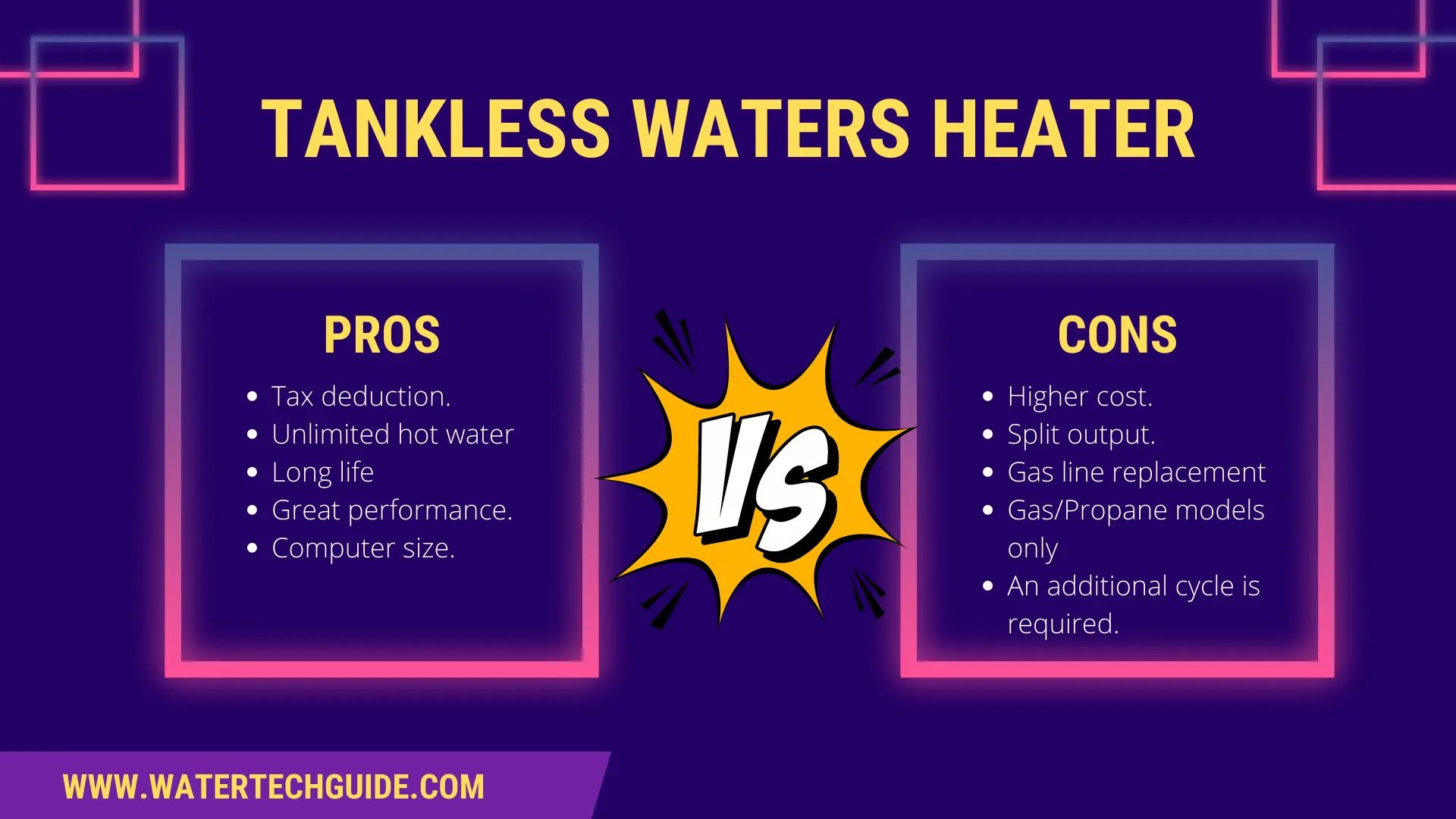
3. How Does a Tankless Water Heater Works (Cons)
- Higher cost. The price of a tanker of water without a tank is usually three times that of a tank-based model. However, the price for a tankless water heater is pushed back with a decrease in power consumption.
- Split output. Hot water produced by a heat-free heater is split between everything that comes out of your house. Therefore, if two or more washing machines and/or tubes were operated at the same time, no one received a higher temperature. Therefore, your shower can be rendered inclined if you use a washer at the same time. However, this problem can be avoided if you buy a separate water heater for each outlet.
- Gas line replacement. If you prefer a waterproof heater for gas, it may be necessary to replace your existing gas line with a larger line to fuel the new heater adequately.
- The iron tube is required (gas/propane models only). To properly install a water heater or propane heater, you need to have stainless steel tubing, which can add to the cost of installation if there is no such tube in your house.
- An additional cycle is required. In order to use specific models of the tank heater, you may need an additional electrical cycle.
Bad Effects of Tankless Water Heater
- Respiratory gas emissions. Gas and propane fuel heater innocent water contribute to the purification of the air. Admittedly, this only happens when puppies operate at very warm and hot temperatures – unlike tank-based water heaters, which require constant electricity.
- Annual production is required (gas units only). A gas-free water heater should be used annually, which can add a second small cost to the operation of the gas.
- High power consumption (electric units only). Wireless water heaters require high levels of power to operate. In contrast, gas and propane heater wastewater do not require electricity.
- Minimum required flow rate. To reach the temperature – part of the water heater system – to activate, a waterproof heater must have a minimum flow rate of 0.5 GPM.
- Lag time. Usually, to make the water heated to the desired temperature, you need to use water for a moment or more with a tank heater. As a result, this can lead to water pollution.
Conclusion
Having the best tankless water heater in your home is not a luxury. Instead, this is the perfect need for your family and yourself for the winter. So before installing a water heater, you need to know everything nitty-gritty about it. In this article, we discuss how does a tankless water heater work?
Finally,
Once you believe you have the best tankless water heater without electricity, and then try to find the one that is right for you. From our top picks, you can get some ideas about the best electric water heaters. After having an in-depth view of all the models you can finally pick one that will serve your purpose better.

